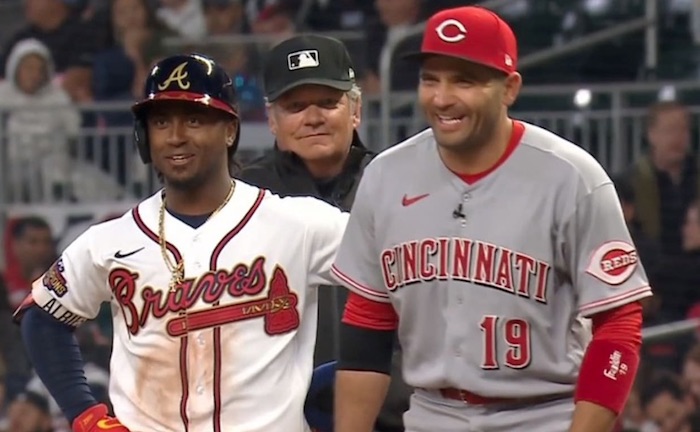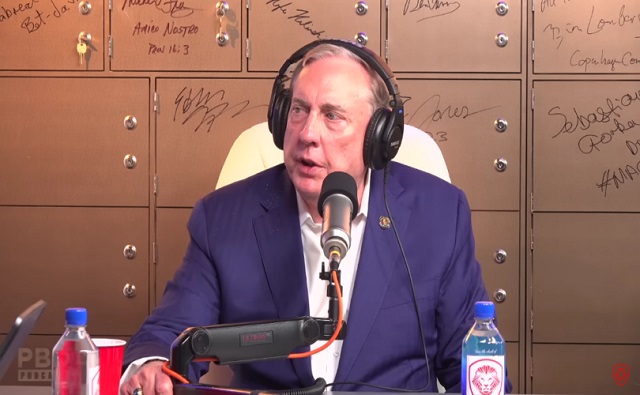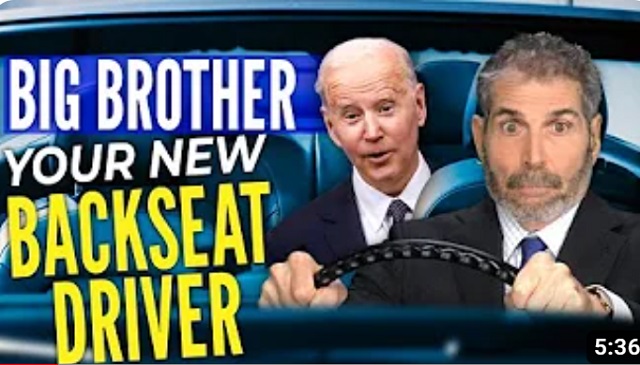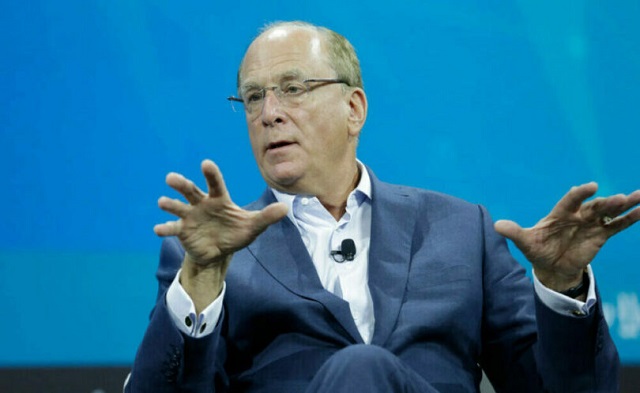Bruce Dowbiggin
Open Mike: Let My People Speak

Canadian baseball GOAT Joey Votto of the Cincinnati Reds turns to Atlanta’s Ossie Albies and asks, ”What do you think about me getting a diamond tooth?”
Albies smiles and says, “Go for it.”
This silly exchange might have just been another throwaway jock remark, except it took place live during the fourth inning of the Cincinnati/ Atlanta home opener last week. Votto was playing first base and Albies has just arrived there with a single. The goofy chit chat was part of ESPN miking Votto live for a half inning.
The technique has never been done during a regular season MLB game. Judging from public reaction, people want to see much more of their favourite sports stars in non-formal interviews. *(Although they could pass on Votto adjusting his protective cup every 30 seconds.)
Votto is that rare athlete who can pull off a conversation in the heat of a close game. The Toronto native is a witty, loquacious guy, and it showed as he shot the breeze in English and Spanish with the ESPN crew (Karl Ravech, David Cone, and Eduardo Pérez) about his “mid-life crisis”, having to be vigilant because his starting pitcher Tyler Mahle doesn’t have a great move to first, his training with a golf pro and assorted other chit-chat.
Not every star is as camera-ready as Votto nor is every sport adaptable to this intimate multi-tasking. But it was hard not to feel that Votto and the ESPN crew were pulling back the shroud on something new. Like movies going from silent to talkies, in-game sports have been almost mute for decades.
Live audio has always been the final frontier of sports broadcasting. Lip reading is the best we could hope for. And here it was; the Votto conversation was akin to hearing The Jazz Singer in 1927. Hard not to imagine the implications— especially for a sport like baseball struggling for relevance with Millenials.
You also got a limited taste of what golf— another sport with a young-demo problem— might be like with wild sound at The Masters this weekend. There were more than the usual “shits” and “fucks” sneaking in to accompany wayward shots. No one tried to apologize for the blue language. But there were also moments where fans were taken inside the action. Scotty Scheffler’s wayward ball-in-the-shrub on No. 18 Saturday showed his caddy talking him out of a risky shot from the branches.

Billy Horschel supplied plenty of “No, it can’t be short” laments as his ball rolled off the green after landing on the green. Jon Rahm was caught pleading with the gods. While Scheffler’s caddy advised his man to hit a “nipper… pretty basic for you”. What a nipper is was not explained by Jim Nantz.
It was just a thimble-ful of audio but better than the incessant bird-chirping audio bed that plays beneath everything at Augusta National. Or the banal blandishments offered up by the broadcasters on behalf of Augusta National.
Some sports are less adaptable to the in-play audio, of course. Perhaps broadcasters could mike a chatterbox wide receiver in the NFL or a talkative goalie in the NHL. At first it right meet with resistance from the traditionalists, but when athletes see the branding opportunities from being uncensored by the network you could see a very rapid acceptance.
And let’s face it. Fans want to hear the inside action from stars who are normally sealed hermetically by cautions management and ownership. And as we said last September, less from cliché ridden analysts and play-buy-play.
“The public is craving the inside audio scoop, yet these events are carried as if it were still the 1990 Masters. Ditto for almost all team sports outside of the CFL and curling. (Rugby allows audio from referee’s video decisions.) It’s like watching a silent movie.
The success of Netflix’s F1 documentary series Drive To Survive (now showing its fourth year) is a perfect example of the public’s demand for the inner sanctum of sport. Drive To Survive has plenty of the Nuke LaLoosh blarney from athletes and owners. But it also has enough free-wheeling about the bitchiness between drivers, the headaches of team managers and some of the greatest video from the pits to intrigue even the least serious fans.”
It can also be a revenue source. As we wrote August 2018: “As we’ve suggested for many years now, fans would probably be amenable to paying for a special channel with unlimited audio. Pay a special fee on top of your NHL Centre Ice or NFL Red Zone subscription and get full live audio from games.
The effect might be like what happened when Hollywood converted from silent to talkies. Instead of scandal they’d have a new generation of viewers interested in their product. You can just see the promotion: “Fans, you’ve have seen their favourite sports stars for years. Now hear them live for the first time.”
Joey Votto just gave them their best advertisement.
Bruce Dowbiggin @dowbboy is the editor of Not The Public Broadcaster (http://www.notthepublicbroadcaster.com). The best-selling author was nominated for the BBN Business Book award of 2020 for Personal Account with Tony Comper. A two-time winner of the Gemini Award as Canada’s top television sports broadcaster, he’s also a regular contributor to Sirius XM Canada Talks Ch. 167. His new book with his son Evan Inexact Science: The Six Most Compelling Draft Years In NHL History is now available on http://brucedowbigginbooks.ca/book-personalaccount.aspx
Bruce Dowbiggin
Coyotes Ugly: The Sad Obsession Of Gary Bettman

It came to this. Playing in the 6,000 seat Mullet Arena on the campus of Arizona State. Owned by a luckless guy who eschewed the public spotlight. Out of the playoffs, their bags packed for who knows where, the Arizona (née Phoenix) Coyotes gave an appreciative wave to the tiny crowd gathered to say Thanks For The Memories.
With that they were history. Although NHL commissioner-for-life Gary Bettman has promised the last in a set of hapless owners that he can revive the franchise for a cool billion should he build the rink that no one was willing to build for the Yotes the past 20 years.
The Arizona Republic said good riddance. “Metro Phoenix lost the Coyotes because we are an oversaturated professional and college sports market with an endless supply of sunshine and recreational choices. Arizona may have dodged a slapshot:
We have the NFL Cardinals, the MLB Diamondbacks, the NBA Suns, MLB spring training, the WM Phoenix Open, the Phoenix Rising, the WNBA Mercury, the Indoor Football League Rattlers and the Arizona State Sun Devils. There hasn’t been a household name on the Coyotes since Shane Doan, and half of Phoenix probably doesn’t know who he was”.
Likely they’ll be a financial success in Salt Lake City where there’s a viable owner, lots of money and a will to make it work. They’ll need a will because— stop me if you’ve heard this before about the Coyotes— the rink they’ll play in this fall has only 12,500 unobstructed views for hockey.
Watching this farce we recalled getting a call from Blackberry co-founder Jim Balsillie in 2008, shortly after our book Money Players was a finalist for the Canadian Business Book of The Year. We’d written a fair bit about the Coyotes in our work and someone had told Balsillie we might be the ones to talk to about a plan he was concocting to buy the bankrupt Coyotes and eventually move them to Hamilton.

Balsillie was salty over the way he’d been used as a stalking horse in the financial troubles of the Pittsburgh Penguins in 1990s. Flush with money from the huge success of RIM, Balsillie offered to buy the Pens, with an eye to moving them to southern Ontario if Pittsburgh didn’t help build a new arena for the team.
In time, Balsillie saw that Bettman was only trying to protect the investment Mario Lemieux and others had in the Pens. Balsillie was the black hat who eventually spooked Pittsburgh into giving the current owners what they wanted. At the end of the day, Mario got his money and Balsillie was given a “thanks for trying”: parting gift of nebulous promises.
Still smarting, Balsille vowed not to be used again. in his desire to bring the NHL to southern Ontario. So when the Coyotes owner Jerry Moyes threw the keys to the team on Bettman’s desk, he saw an opening in the bankruptcy that followed. Seeing Bettman as the impediment, Balsillie decided to buy the team out of bankruptcy, a process the NHL could not legally prevent.
What Balsillie wanted to know was “What then? How would Bettman fight back?” We told him that no one flouts Bettman’s authority within the NHL. (All the current owners since 1993 have come aboard on his watch.) And that he’d have to get the Board of Governors to approve his purchase. Odds: Nil.
That’s what happened. Rather than admit that the Valley of the Sun was poisoned for hockey, Bettman found another series of undercapitalized marks to front the franchise while the league quietly propped up the operation. No longer was the Coyotes’ failure about the fans of Arizona. It was about Gary Bettman’s pride.

Protestors stand outside a press conference in Tempe featuring Arizona Coyotes executives discussing propositions related to a new arena and entertainment district. (Photo by Brooklyn Hall/ Cronkite News)
Where he had meekly let Atlanta move to Winnipeg he fought like hell to save Arizona. And his power. (His obstinacy on U.S. network TV is another story.)
Fast forward to last week and the abject failure of that process. The Arizona Republic naively fawned on Bettman for his many attempts to save the team. In fact, they were just attempts to buttress his grip on the league. While the Coyotes may have been a mess, Bettman has succeeded in preserving the investments of most of the business people who bought his NHL business prospectus.
Sometimes it meant riding into Calgary to chastise the locals for their parsimony in not giving the Flames a new rink. Ditto for Edmonton. Ditto for Winnipeg and other cities. Other times it was to shore up weak partners to protect the equity of other prosperous cities. Sometimes it was to tell Quebec City, “Not gonna’ happen.”
For his loyalty to the owners and through some luck— Gretzky to the Kings— Bettman has made the NHL work in places no one might’ve imagined. Nashville. Raleigh. Tampa. Las Vegas. Dallas. Not at the level of the NFL, NBA or MLB, but at a comfortable equity-affirming status. Nothing happens without his say-so in the NHL. Or without him getting credit. Secondary NHL execs who wanted credit for their innovations were quietly punted.
When Houston finally gets a franchise from Gary they’ll part with $1.5 billion for the honour. While the commissioner has played down new franchises and expanded playoffs, you can bet your last dollar that he’s told owners they’re in line for more expansion cash— cash they don’t have to split with players in collective bargaining.
One more certainty. As long as Bettman rules the NHL you won’t see an NHL team back in Arizona.
Bruce Dowbiggin @dowbboy is the editor of Not The Public Broadcaster A two-time winner of the Gemini Award as Canada’s top television sports broadcaster, he’s a regular contributor to Sirius XM Canada Talks Ch. 167. Inexact Science: The Six Most Compelling Draft Years In NHL History, his new book with his son Evan, was voted the seventh-best professional hockey book of all time by bookauthority.org . His 2004 book Money Players was voted sixth best on the same list, and is available via brucedowbigginbooks.ca.
Bruce Dowbiggin
Why Are Canadian Mayors So Far Left And Out Of Touch?

‘The City of Edmonton pays for a 22-person climate team but doesn’t know who on that team is responsible for what, or what that team has accomplished. Meanwhile, Council takes a pay raise and bumps our property taxes by 8.6%” @michaelistuart
We just returned from a long trip to discover that the City of Calgary wants to potentially re-zone our neighbourhood. Bridle Estates is a collection of 175 bungalow villas for people aged 55-plus. While some people still work most of the inhabitants are retirees. The city’s earnest idea is to create low-cost housing for the tens of thousands arriving here in the city from away.
You can see why a city hall obsessed with white privilege wants to democratize our neck of the south-west corner of the city. Enforced justice has a great tradition. 1970s American cities decided that bussing was the antidote to segregation. After a SCOTUS decision allowing the practice in 1971 (back when liberals owned the court) progressives pushed through an aggressive plan to bus kids from the inner city to the leafy suburbs. And vice versa.
It worked like a charm. For conservatives, that is. It radicalized a generation of voters who soon installed Ronald Reagan as president, and empty buses went back to the depot. The Democrats went from the party of the people to the party people in Hollywood. With time dulling memories, contemporary Woke folk are reviving the integration dream. This time the mostly white suburbs will bear the brunt of the government’s immigration fixation (400K-plus in the third quarter).

There are meetings planned where citizens will be able to address their elected officials— no doubt in a respectful voice. But anyone who’s dealt with Climate Crisis Barbie— Mayor Jyoti Gondek— has much optimism. This is a mayor who exploited a three-way split in centre-right voting here to declare a Climate Emergency on her first day in office.
Then she rolled out hate-speech laws to protect her from being razzed in public. For this and other fabulist blunders— her messing with the new arena project drove a worse deal and a two-year delay in a home for the Calgary Flames— she faced a recall project (which failed to collect over 400K voters’ signatures).
With a housing bubble expanding everyday, Her Tone Deafness has decided that owning a home is so passé. ”We are starting to see a segment of the population reject this idea of owning a home and they are moving towards rental, because it gives them more freedom.” She added that people have become “much more liberated around what housing looks like and what the tenure of housing looks like.”
As the Calgary’s schmozzles and Edmonton’s dabble in climate extravagance illustrate the municipal level of government in Canada is a few lobsters shy of a clambake. Across the country major cities are in the hands of radical NDP soldiers or virtue warriors who would rather have symbols than sewers to talk about.
In Toronto, Jack Layton’s widow Olivia Chow is leveraging her 37 percent mandate to make Toronto a kinder, Wok-er city. In Vancouver and Victoria, B.C., the open-air drug agendas of new mayors and city councils have sent capital fleeing elsewhere. Despite crime and construction chaos, Montreal mayor Valerie Plante won a second term, by emphasizing her gender.

In times when the coffers were full, this ESG theatre might have been a simple inconvenience. But since the federal and provincial governments began shoving responsibilities and costs downward to municipalities there is no wiggle room for grandstanding politicians at the city level. Or for hapless amateurs.
With the public incensed over residential property tax increases on one side and the blandishments of aggressive developers on the other, competent governance has never been more needed in the urban areas. While feds can (and have) printed money to escape their headaches and the provinces can offload costs onto the cities, the municipalities have no room for risk.
The time bomb in this equation is the debt load that the three levels can sustain. After this week’s budget, federal spending is up $238B, or 80 percent since 2015. Coming off this free-spending budget the feds have pushed the federal debt to more than $1.2 trillion this year (in 2015, the debt was $616 billion.) None of the provinces has shown any appetite for the 1990s-style cuts to reduce their indebtedness. Leaving cities to crank the property-tax handle again.
So far, Canada’s cities have been able to use friendly municipal bonds to ease their fiscal problems. But if the Canadian economy continues its tepid performance with no reduction in debt, financial experts tell us that there could be a flight from Canadian municipal bonds— with a consequent spike in interest rates elsewhere.
The backlash on free-spending governments will be severe— and restricted municipalities will be hardest hit. None of this is resonating with Canadians still flush with cash from Covid. The stock markets are still buoyant and those living in cashbox houses are counting their dividends. Willful denial is the Trudeau legacy.

Which is why so many Canadian were shocked last week when American AntiTrump media star Bill Maher did an intervention on Canadian conceits. Using the True North as his warning to America, Maher ripped apart the gauzy leftist dream of Canada as the perfect society, the Sweden north of Estevan. By the time he was done, the single-payer myth was bleeding on the ground.
Maher knows that the bill is coming due for free-spending Canada and its climate charlatans. (The IMF is already warning of a global crisis over debt loads.) The question is: will Canadians come to the same conclusion before it’s too late to save the cities?
Bruce Dowbiggin @dowbboy is the editor of Not The Public Broadcaster A two-time winner of the Gemini Award as Canada’s top television sports broadcaster, he’s a regular contributor to Sirius XM Canada Talks Ch. 167. His new book Deal With It: The Trades That Stunned The NHL And Changed hockey is now available on Amazon. Inexact Science: The Six Most Compelling Draft Years In NHL History, his previous book with his son Evan, was voted the seventh-best professional hockey book of all time by bookauthority.org . His 2004 book Money Players was voted sixth best on the same list, and is available via brucedowbigginbooks.ca.
-

 Censorship Industrial Complex2 days ago
Censorship Industrial Complex2 days agoDesperate Liberals move to stop MPs from calling Trudeau ‘corrupt’
-

 Health1 day ago
Health1 day agoTransgender activists are threatening the author of scathing UK report on child ‘sex changes’
-

 conflict2 days ago
conflict2 days agoCol. Douglas Macgregor: US is ‘facing disaster’ as it funds overseas wars while bankrupt
-

 conflict24 hours ago
conflict24 hours agoCol. Douglas Macgregor torches Trump over support for bill funding wars in Ukraine and Israel
-

 Energy2 days ago
Energy2 days agoA Wealth-Creating Way of Reducing Global CO2 Emissions
-

 COVID-191 day ago
COVID-191 day agoInquiry shows Canadian gov’t agencies have spent $10 million on social media ads for COVID jabs
-

 Alberta23 hours ago
Alberta23 hours agoAlberta’s baby name superstar steals the show again
-

 Frontier Centre for Public Policy22 hours ago
Frontier Centre for Public Policy22 hours agoThe end of Canada: The shift from democracy to totalitarian behavior in the ‘pandemic era’







